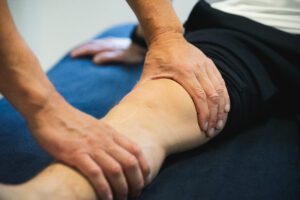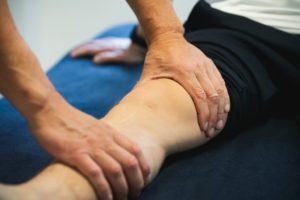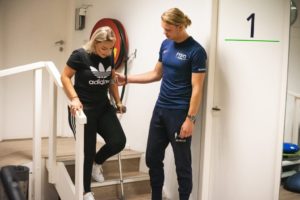Frozen Shoulder: Symptoms, Causes and Treatments
With a frozen shoulder you suffer from a stiff or stuck shoulder. This is often accompanied by pain around the shoulder joint, sometimes radiating to the upper and forearm. A stiff shoulder can go away on its own, but it often takes a long time. It can take six months to 1 year, sometimes up to 3 years.
What is a frozen shoulder?
A frozen shoulder almost always starts with pain in the shoulder, which becomes progressively worse. The pain is caused by inflammation within the joint capsule. This is the connective tissue that covers the bones of a joint. As time progresses, you become less able to move your shoulder. This causes the joint capsule to stiffen and your shoulder becomes, as it were, frozen. We only speak of a frozen shoulder if you can no longer move your shoulder properly in at least three directions.
Frozen shoulder cause
A frozen shoulder does not always have a clear cause. Sometimes it occurs after a fall or surgery, but a frozen shoulder can also be the result of long-term stress. Frozen shoulder is more common in people with diabetes, heart, thyroid and lung disorders or Parkinson's disease.
Frozen shoulder symptoms
The complaints of a frozen shoulder can almost always be divided into three phases:
1. The freezing phase
This phase can last from several weeks to an average of nine months. You are experiencing pain in the shoulder that is becoming increasingly severe, but your shoulder is not yet completely fixed. The pain may radiate into the forearm. You may also experience pain in your upper back and neck. You may experience intense pain during daily movements, such as dressing or driving a car. But you can also suffer from serious pain at rest or during sleep.
In this phase it is important to keep moving the shoulder minimally, but not to force anything. For example, try hanging your shoulder and gently making small, rotating movements.
2. The frozen phase
In the frozen phase, your shoulder is stuck. The pain gradually decreases, but the stiffness remains. This phase lasts on average four to nine months. In this phase you can do exercises step by step more easily and intensively.
3. The defrosting phase
The shoulder slowly loosens. The pain disappears completely and mobility returns to the shoulder. This phase can last four to twelve months. Keep practicing and try to use your shoulder more and more in your daily life. For example, see if you can swim.
Frozen shoulder treatment and exercises
A frozen shoulder usually goes away on its own, but this takes a long time. To ensure that the process runs as quickly and smoothly as possible, it is wise to seek the expert guidance of a physiotherapist. Together you can determine which exercises are most suitable for you.
Frozen shoulder injection
In some cases, the pain a patient experiences with a frozen shoulder is so severe that pain relief is required. Pain medications such as paracetamol, diclofenac and ibuprofen can help with this. An injection is also an option. Always discuss any form of pain relief for a frozen shoulder with your physiotherapist and GP first.
Prevent frozen shoulder? You can do all this
The most important thing you can do to prevent a frozen shoulder (in the future) is practice. Exercise is important. Make sure that you do not do the same movement all day long. For example, when you use a computer mouse all day or sort mail. In that case, the shoulder complaints continue or even get worse.











